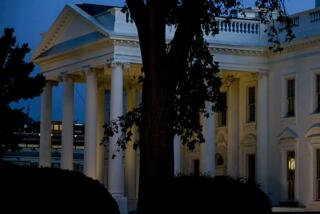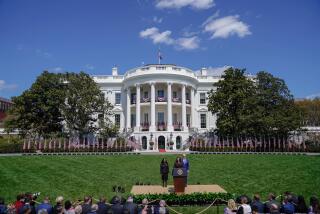Soviets Deny ‘Spy Dust’ Use : Say U.S. Poisons Ties With ‘Absurd’ Charges
- Share via
WASHINGTON — The Soviet Union, angrily denying the “absurd allegation” that it used chemical tracers on American diplomats in Moscow, accused the United States on Thursday of “poisoning the atmosphere in relations between our countries and fomenting enmity towards the Soviet people.”
The State Department, which received the protest in a note from the Soviet Embassy here, responded through a spokesman that “everything we said . . . is perfectly true.” Charles Redman, the spokesman, added that there is “absolutely no U.S. attempt to sabotage prospects” for the Geneva summit meeting between President Reagan and Soviet leader Mikhail S. Gorbachev in November.
Redman said the United States disclosed use of the potentially cancer-causing chemical--and demanded that its use be halted--solely to protect American personnel from further exposure.
Preliminary tests indicate that the chemical, identified as nitrophenylpentadiene, or NPPD, can cause sudden genetic changes in cells, but Redman said that health concerns currently are low because exposure levels were “minute.”
“It’s the principle of the matter, however, that these chemicals were applied to our people that concerns us,” he said.
The yellow-white powder reportedly was found on doorknobs, automobile steering wheels and other objects that diplomats were likely to touch. The prime targets for the chemical espionage apparently are Soviet dissidents and others who meet clandestinely with U.S. diplomats.
The Soviet note, as reported by the Soviet news agency Tass, called the U.S. charges “absurd . . . absolutely out of place . . . totally unacceptable . . . outrageous . . . a gross falsehood.”
“Nothing of the kind was ever practiced or is practiced in our country,” the note said. “One cannot help seeing behind the raising of this artificial question a quite different scheme, that of preparing the ground for another slander campaign against the Soviet Union. . . . We are warning that the American side will bear all responsibility for the possible consequences of actions of this sort.”
‘Designer’ Chemical
A senior State Department official said that chemical tracking agents “are not used against diplomats” in the United States. The official added that NPPD has never been used in this country because it is a “designer” chemical fabricated by the Soviets.
Spokesmen for the FBI and the Los Angeles Police Department said that nontoxic chemical markers are widely used across the nation in criminal investigations.
“We use chemicals to investigate crimes and capture criminals,” said Cmdr. William Booth, a spokesman for the Los Angeles police.
He noted that red or blue dye is used on currency so that it will rub off on bank robbers and make them readily visible in public. Also, he said, a chemical dust that is invisible to the naked eye--but glows under ultraviolet light--is sometimes sprinkled on currency and other objects so it will rub off on unsuspecting thiefs. Once arrested, they can be linked to the stolen property.
“We believe the stuff we use is not harmful,” Booth said, adding that no one has ever claimed harm.
The American Foreign Service Assn., an organization of career diplomats, voiced outrage at the Soviets’ use of the chemical but also raised concerns about how much the State Department was doing to protect employees and test for ill effects.
The group posed this question in a statement: “What action is being taken to test employees and dependents who have returned from Moscow, as well as those who have retired or resigned?”
Tests Termed Unnecessary
The answer given by Redman at news briefings was that such tests are unnecessary until more is known about the toxicity of the chemical. The chemical has been determined through biological testing to cause mutations, or genetic changes, he said. Mutations can cause cancer in humans, but extensive tests, possibly lasting years, will be necessary to determine if the chemical is dangerous, he added.
Already, the incident is causing repercussions in Congress. Rep. Jim Courter (R-N.J.) wrote President Reagan on Thursday, urging that the State Department dismiss 211 Soviet citizens who are employed at the U.S. Embassy in Moscow and the American Consulate in Leningrad.
Amendment Dropped
After typewriters in the Moscow Embassy were found last spring to be “bugged,” the House passed an amendment sponsored by Courter that prohibits the employment of Soviets. But the amendment, strongly opposed by the State Department, was dropped in a conference with the Senate.
More to Read
Sign up for Essential California
The most important California stories and recommendations in your inbox every morning.
You may occasionally receive promotional content from the Los Angeles Times.













